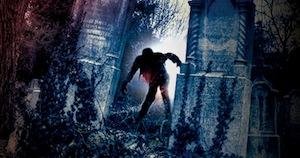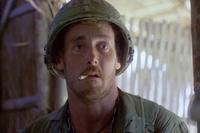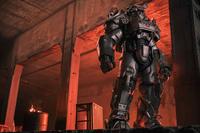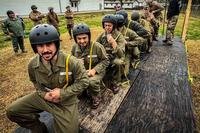
Yep, time for some more zombies. What we've got here is an article by Dana Fredsti, author of the new novel Plague Town, a story that features a zombie hunter named Ashley Parker.
Dana Fredsti is the US-based author of Murder for Hire: The Peruvian Pigeon and co-author of What Women Really Want in Bed. She blogs frequently and has made podcast and radio appearances. She has also appeared in various zombie/horror movies projects, and worked on Sam Raimi’s Army of Darkness as an armourer's assistant, sword-fighting captain and sword-fighting Deadite.

Dana Fredsti on the set of "Army of Darkness"
Plague Town is set in the small university town of Redwood Grove, where people are succumbing to a lethal strain of flu. Here's the promo copy from the book jacket: "People are dying—but not for long. Ashley Parker and her boyfriend are attacked by these shambling, rotting creatures that crave human flesh. Their lives will never be the same again. When she awakes Ashley discovers that she is a “wild card”—immune to the virus—and is recruited by a shadowy paramilitary organization that offers her the chance to fight back. Fatally attracted to her gorgeous instructor, and bonding with her fellow wild cards, Ashley begins to discover skills she never knew she had. As the town falls to ever-growing numbers of the infected, Ashley and her team fight to contain the outbreak—but will they be enough?"
Getting the Zombies Right in 'Plague Town'
by Dana Fredsti
When I first started to write, my attitude regarding research could be summed up thusly: “Research? I don’ need no stinkin’ research!” I wasn’t exactly lazy; I just tended to write about what I knew (which could be summed up thusly: chocolate, cats, theater, snarky humor, and more chocolate. This was back in the Dark Ages before Google and Wikipedia (that’s right, folks; no internet!). Most questions I had were directed to my then boyfriend, who was a licensed weapons handler on films, historian, and all around trivia-bank of knowledge. And when it came the details of, say, a drowned corpse, I’d toss in the words “sodden”, “water-logged”, “blue”, and “swollen” and leave it at that.
As I matured as a writer, I realized research had its place. I started taking it more seriously and discovered it could even lead to interesting new plot/character ideas that hadn’t occurred to me before. By the time I began working on Plague Town, I was open to the idea of research, but figured “Eh, zombies. I know zombies. I don’t need much stinkin’ research.”
Yeah, not so much.
I quickly realized with the amount of weapons, combat, and military action I had planned for Plague Town, I’d need to collect information. On one hand, I didn’t want to go overboard on weapons descriptions. I’ve read a few zombie stories and books that are what I refer to as “weapons porn” because about a third of the work consists of detailed and loving descriptions of firearms and their accoutrement along the lines of "He unholstered his Glock PT 24/7 with the magnum stock and special titanium bullets with the notched casings, sliding it out of the custom mahogany triple-sec holster which hooked onto the nylon webbing belt that snugged his waist like a lover's caress..." Ahem. You get the idea.
On the other hand, though, I didn’t to be that woman in the creative writing class scene from Throw Momma from the Train who writes Tom Clancy style fiction, but doesn’t know what to call that “thing” the submarine captain speaks through.
I wanted just enough detail to give a layer of reality to what is a highly improbably scenario: the dead returning to life and eating the living (let’s face it; no matter how much people like me plan for it, it’s probably not going to happen). Hopefully I succeeded via the following resources:
1. Personal experience
I have a fairly extensive background in theatrical combat and martial arts, especially weapons of the bladed variety. Love me my swordplay and I’ve been training since I was eighteen. I’ve done both choreography and sparring; trying to figure out what works theatrically and realistically with the former, and doing my best to score hits and defend myself with the latter. I took karate for a couple of years, along with a smattering of judo, kenjutsu, kung fu and kickboxing to supplement the theatrical training. Over the years I’ve been punched, kicked, stabbed, hit with the business edge of a blade, and taken hard falls (sometimes on purpose, sometimes not so much). I’ve experienced fighting in a melee situation, with a couple hundred other fighters charging by on horses, fighting uncomfortably close to me, and sometimes running into me. I’ve also had the fun of slicing into watermelons with a sharpened saber (yeah, I ran with a strange crowd) so there’s that visceral feel of the blade actually cutting into something. My ever-patient boyfriend helped by being a “demo-dummy” when I wanted to see if a particular set of moves would work. I destroyed his brain many times over during the writing of Plague Town.
I also have some firearms experience (not as much as I’d like, but I live in San Francisco so what do you expect?) and spent time in the desert blowing the faces off of ‘80s “big hair” bands (posters, people!) with a semi-automatic rifle, as well as many visits to indoor shooting ranges (they have zombie targets!). I’ve had hot brass fly into the neck of my shirt and had the crap kicked out of me by a double-barrel shotgun. Of course I realize none of these experiences come close to being in the midst of an actual fire-fight, but the sense memories come in handy when writing fight scenes.
2. The Internet
All worship Google! Yes, the internet, my favorite research tool in the world as far as enabling me to find out all sorts of useful and interesting facts without getting off the couch. Of course, you have to make sure your sources are good ‘because there is a lot of suspect content out there. I visited a lot of sites with .gov and .mil at the end of the web addresses to try and get the most accurate info possible. These sites proved useful for finding out the proper order ranks in the various branches of the military; what, exactly constitutes Special Forces; and how the CDC would handle an actual zombie outbreak. I also browsed hardware store sites for pictures of things like sledgehammers, crowbars, hammers, materials for fencing, the strongest padlocks available, and much more.
3. Books
I just love the fact that these days I can buy the following books: Zombie Combat Manual (Roger Ma); Zombie CSU: Forensics of the Living Dead (Jonathan Maberry); Zombie Survival Guide (Max Brooks); and U.S. Army Zombie Combat Skills (Dept. of U.S. Army). There are others, but these four were my favorite “non-fiction” go-to books for combat and procedure directly related to zombies. I also went to the library (the primary search engine available pre-internet, for you younglings out there) for some medical manuals to try and get a little bit of fact behind the fiction of my zombie plague.
4. Ask the Experts
Since the military definitely plays a role in Plague Town, including several important characters and some crucial scenes, I wanted to make sure they had enough accuracy to avoid those in the know (probably everyone reading this article) wanting to throw my book across the room in disgust because of stupid mistakes. And even though I’m the daughter of a Korean War veteran, the extent of, say, military-lingo I’m familiar with starts with “Roger that”, mixes in a little “Whiskey, Tango, Foxtrot”, and ends with “Oorah” and “Hooyah” (and since I got both of those from Wikipedia, I’m not sure if they’re correct either).
So I enlisted (pun intended) expert help. Rather than try and explain the type of things I asked, here’s a good example of an actual question sent to Staff Sergeant Phillip McSorley (who also read several scenes for me to check for accuracy and realism): Oh Military Expert Person! I am writing a scene where a group of soldiers are going to a mountain rest stop to clean it (zombies, doncha know). It's from the perspective of one guy, a lieutenant, and I have no idea of what tactics they'd use... who goes in first, do they really say things like "Charlie Tango Donut, over!" ... Do they send in pairs? I'm thinking this is a small group (would there be a specific number?) and again, while it's military, they don't have to be specifically army or marine or air force as their specific job is taking care of zombie outbreaks. And yes, I realize this sounds totally lame... but I swear the book isn't!
I now know basically how a “stack” works; that doorways are called “fatal funnels,” and that first one in would be someone of a lower rank. I found out what type of civilian vehicles the military would use under certain circumstances. I found out what type of weapons/firearms weapons experts and gun enthusiasts would choose if they were fighting the walking dead. I acquired gun-savvy dialogue that didn’t sound like an informational manual. When my own sense memory failed me or I didn’t have experience with a specific firearm I could ask for – and receive – vivid, succinct descriptions of the specific sounds, smells, and the feel of these weapons. I received numerous links and informational posts on firearms, knives, and bladed weapons. I now have a “weapons folder” on my computer chock full of most excellent research material. I now know what would be the most effective place a zombie could bite in order to insure someone bleeds out really quickly. Good stuff!
I’d like to give a shout out to my panel of experts: Sgt. McSorley; my cousinSteffan Fredsti, a U.S. Army Combat Medic; Brian Thomas, weapons handler and historian; T. Chris Martindale, gun enthusiast and writer; and my beloved “big brother” John David Norman, former Marine who passed away last January. You all rock!





